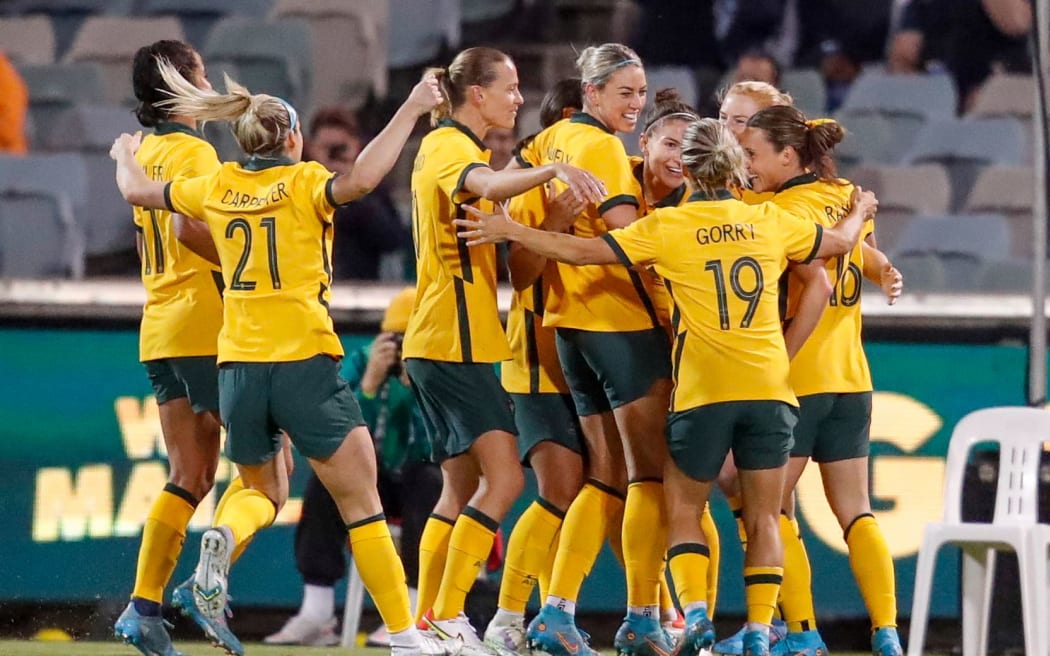
The Matildas celebrate.
Photo: photosport
Just four days out from the FIFA World Cup, Australia’s Matildas have released a video calling on domestic and international governing bodies to further invest in the women’s game to ensure the month-long tournament leaves a lasting legacy.
Organised in partnership with their union, Professional Footballers Australia, the video features each of the 23 World Cup players speaking about the need for Australian football in particular to capitalise on the momentum that the tournament will generate.
They specifically call for a full-time A-League Women competition in addition to more women involved in coaching, refereeing, and administration across the pyramid.
Symbolising the unified nature of the squad and their shared message, each Matilda recites a line from a single script that invites fans, businesses, and political organisations to increase their support of women’s football above and beyond this year’s tournament.
“They showed us how to fight for recognition, validation, and respect.”
It follows the Socceroos’ decision to release a video statement around human rights ahead of the 2022 men’s World Cup in Qatar, with the timing of the video intended to give the players clear air during the tournament itself.
In the Matildas’ video, the team lists several key dates – from their first Women’s World Cup qualification in 1995 to their first ever collective bargaining agreement in 2010 to the 2015 strike to protest the lack of support from Football Australia – that have paved the way for the conditions the current team enjoys.
“For us, this World Cup is a celebration of that progress that we’ve had to earn every step of the way,” Alanna Kennedy says.
“But we’re not stopping now,” Charlotte Grant continues.
On a global level, the players highlight the overwhelming lack of unions and collective bargaining agreements for women’s national teams, while also calling out FIFA for offering one quarter of the prize money given to the men’s World Cup in Qatar last year.
Of the 32 nations competing at this year’s women’s tournament in Australia and New Zealand, only a handful have union representation and collective bargaining agreements that guarantee minimum standards and pay.
Famously, the USA women’s national team used the platform of the 2019 Women’s World Cup to publicise their fight against their own federation, US Soccer, in regard to equal pay and conditions for their athletes – a fight that they ultimately won.
However, the USA and Australia are the privileged few. Nigeria, Jamaica, Canada, England, Zambia, South Africa, and Spain are all entering this year’s tournament in public tension with their respective governing bodies around pay, conditions, and support leading into and after the World Cup.
“736 footballers have the honour of representing their countries on the biggest stage this tournament,” Clare Wheeler says.
“Yet many are still denied the basic right to organise and collectively bargain,” Clare Hunt finishes.
“Collective bargaining has allowed us to ensure we now get the same conditions as the Socceroos, with one exception: FIFA will still only offer women one-quarter as much prize money as men for the same achievement,” Tameka Yallop says.
The 2023 tournament is the first time women’s national teams have been given dedicated training bases, while FIFA has mandated that all players receive a minimum amount of money, conditions, and resources throughout the event.
FIFA have pledged to equalise World Cup prize money for their two senior tournaments by 2027.
“The growth of women’s sport, and women’s football, has been phenomenal and the transformation of the Matildas’ environment has been emblematic of that development over a very short period of time,” PFA co-chief executive Kate Gill said.
“But the players are acutely aware that much of that growth has been delivered through courageous actions by generations of players and that future progress will likely be driven by the players raising their voices again.
“There are many more improvements that can be achieved before women’s football can truly achieve parity with men’s football, and the current group of 23 players want to use their platform – and the platform of the World Cup – to accelerate further change, but importantly leave a legacy for future players.”
Until that happens, women footballers will continue to use their voices to advocate for themselves and for each other, just as they have always done.
– This story was first published by the ABC
For all the latest Sports News Click Here
For the latest news and updates, follow us on Google News.

